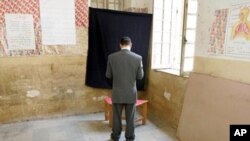Egypt's parliamentary elections are less than a week away and even though government officials insist the balloting will be free and fair, many Egyptians remain pessimistic the process will lead to fundamental change.
Some are too busy simply trying to make a living in tough economic times to get involved in politics. Others are skeptical about the political process in a country that has been ruled by the same man for almost 30 years. And still others point to what they see as suppression of any credible political opposition.
In the middle-class Cairo suburb of Dokki, election posters dangle from billboards or hang from lamp-posts alongside the heavy bustle of traffic. Merchants go about their business, mostly ignoring the political undertow of the November 28 parliamentary balloting.
Voter indifference
Ahmed, a vegetable seller, says the election doesn't matter much to him. Even though he comes from the same province as President Hosni Mubarak, the street merchant places little faith in Egypt's political process.
"I'm tired from working two jobs," he complains, "and I don't have time to worry about politics."
Egyptian political analysts say those kinds of attitudes are likely to persist unless Mubarak's government offers more transparency in the way leaders are chosen. And few are optimistic that will happen.
Voting irregularities occurred in past elections. Human rights groups have accused Egyptian authorities of using force against political opponents and voters to keep Mubarak's National Democratic Party in power. In recent days, Egypt's Muslim Brotherhood opposition group says security forces have arrested several hundred of its supporters in fresh clashes around the country.
Government: poll will be fair
Egypt's foreign ministry is bristling over a recent U.S. call for international observers to monitor the elections. Ministry officialssaid the U.S. demand amounted to meddling in Egypt's internal affairs and was a violation of the nation's sovereignty.
Karim Haggag, director of the Egyptian Press and Information Office, told a recent panel at the Voice of America that the use of international observers was not necessary to guarantee transparent elections.
Haggag said the polling will be supervised by an independent high elections commission and complemented by a system of judicial observers.
"I think taking these things together you have a very robust system of safeguards that will insure that these elections will be free and fair," he told the symposium hosted by VOA's English to Middle East Service.
Analysts skeptical
But many analysts are less than optimistic about the election's transparency and chances the results will lead to significant reforms. The elections are a prelude to a presidential vote next year that is lining up as a referendum on President Mubarak's positioning to stay at
Egypt's helm.
Abdallah al Ashaal, international relations professor at the American University of Cairo, says the ruling National Democratic Party has been using a variety of methods to hold on to power and discourage competition in the parliamentary vote. Ashaal has expressed an interest in running for president himself, but says he expects Mubarak and his ruling party to maintain power.
"There is a culture of despair over reform," Ashaal says.
From his book-lined study overlooking both a church and a mosque, analyst Amr Hamzawy, too, sees little competition in Egypt's political landscape.
Egypt recently cracked down on the media and members of opposition groups, Hamzawy says, including the Muslim Brotherhood. He says the crackdowns are indications that the government has no intention of opening up its political systems.
"Most probably, after the (November) elections, we will still have pretty much the same picture we are looking at as of now," says Hamzawy, an analyst at Carnegie Endowment for Peace in the Middle East. "The NDP will continue its dominance over the legislative process. So, at the macro level, not much will happen."
Hamzawy expects that the Muslim Brotherhood will lose many of the 88 parliament seats that it now holds in favor of moderate opposition parties, including the liberal Wafd and the leftist Tagammu Party.
Fouad Ajami, director of Middle East Studies at The Johns Hopkins University in the United States, says despite any claims to the contrary, Egyptians are convinced the elections ultimately "reflects the will of the ruler (Mubarak), the family members around him, and the security apparatus."
"Egyptians are a shrewd and knowing people who see through the pretensions of the regime and the melodrama of the ruling party, offering a measure of false choice," Ajami says.
Still, some analysts hope that international pressure might lead Egypt on a new road toward Democratic reform.
Glimmer of hope
Saad Eddin Ibrahim, an Egyptian-American political sociologist and democracy activist, argues that the elections are crucial to planting deeper democratic roots not only in Egypt but throughout the Middle East. "Egypt is the biggest Arab country in the Middle East," Ibrahim says. "It is the center of the Arab world. It has always led culturally and politically and if the election is carried out freely and fairly, Egypt can hope to lead the democratic transformation of the region."




